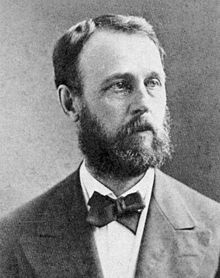Asaph Hall
Asaph Hall (born October 15, 1829 in Goshen , Connecticut , † November 22, 1907 in Annapolis , Maryland ) was an American astronomer and the discoverer of the two Martian moons Phobos and Deimos .
Hall's father was a watch manufacturer whose business was bad and who died when Asaph was 13 years old. After the death of his parents, Hall took an apprenticeship as a carpenter and then attended the University of Michigan , where he studied astronomy . For lack of money he was forced to leave the university and in 1857 to take a position at the Harvard College Observatory in Cambridge . There he became an expert in calculating orbits . In August 1862, Hall moved to the United States Naval Observatory in Washington, DC , where he stayed until 1891. There he became a professor of mathematics in 1863 .
In 1877 Mars was unusually favorable for the observing astronomers who turned their attention to the red planet around the world. This led on the one hand to the discovery of the “ Mars channels ” by Giovanni Schiaparelli and on the other hand to the discovery of the two Martian moons Phobos and Deimos by Hall. Here he was very actively supported by his wife Chloë Angeline Stickney Hall , who repeatedly encouraged him to make further observations. Hall used the large 26-inch “Great Equatorial” refractor , the largest instrument of its kind in the world at the time. Hall also calculated the orbits of the two moons. He had four children with his wife.
Asaph Hall was a member of the National Academy of Sciences since 1875 and of the American Philosophical Society since 1978 . In 1879 he received the gold medal from the Royal Astronomical Society of Great Britain and was elected to the American Academy of Arts and Sciences and the Académie des sciences . On December 5, 1880, he was elected a corresponding member of the Russian Academy of Sciences in St. Petersburg . In 1891 Hall left Washington for Annapolis, where he died in 1907.
The lunar crater Hall and the asteroid (2023) Asaph are named after him. The same applies to the Hall cliff on Alexander I Island in Antarctica.
Web links
- Wolfgang Steinicke: Asaph Hall and the discovery of the Martian moons
- Stickney Crater - Astronomy Picture of the Day of November 7, 2009.
- A. Hall publications in the Astrophysics Data System
- Obituaries for A. Hall in the Astrophysics Data System
Individual evidence
- ^ Member History: Asaph Hall. American Philosophical Society, accessed September 19, 2018 .
- ^ List of members since 1666: Letter H. Académie des sciences, accessed on November 22, 2019 (French).
- ^ Foreign members of the Russian Academy of Sciences since 1724: Hall, Asaph. Russian Academy of Sciences, accessed November 22, 2019 (Russian).
| personal data | |
|---|---|
| SURNAME | Hall, Asaph |
| BRIEF DESCRIPTION | American astronomer, discoverer of the moons of the planets Mars, Phobos and Deimos |
| DATE OF BIRTH | October 15, 1829 |
| PLACE OF BIRTH | Goshen (Connecticut) , USA |
| DATE OF DEATH | November 22, 1907 |
| Place of death | Annapolis, Maryland , USA |
